The most explosive moments in Aussie rock music history
From Cold Chisel’s set-smashing performance on Countdown to Rose Tattoo’s outrageous TV ban and an Opera House riot, are these the wildest moments in Australian music?
Music
Don't miss out on the headlines from Music. Followed categories will be added to My News.
When Cold Chisel takes the stage for three A Day on the Green shows across Victoria this summer — two of which are already sold out — the most you can expect to see raised in anger is a nice glass of shiraz.
Back in the day when no Chisel gig was over until Jimmy Barnes thrust his trademark bottle of vodka into the air, the legendary band stepped on to a different stage and delivered one of the most explosive moments in Oz rock.
It was February 1981. Cold Chisel’s album East was the highest-selling Australian album of 1980 and the band was nominated for 10 Countdown Awards — Australian music’s then night of nights (before the ARIA Awards were born).
Chisel had beef with Countdown. The show had refused to play Khe Sanh because of its lyrics, and the band hated the show’s policy requiring bands to mime their performances.
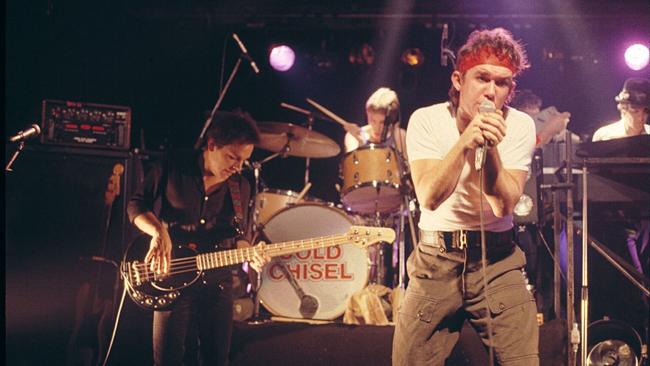
“We were p---ed off because we wanted to get up there and play live,” Barnesy told Foxtel channel Max.
Then there was the frustration that neither Countdown nor the awards show’s sponsor, TV Week, had supported the band in the early years.
“Really, what do TV Week have to do with rock ‘n’ roll?” Barnes asked in the 1983 doco Last Stand.
“They put your photo in once a month and think they can tell you how to run your business.”
So, the week before the awards, Chisel decided “to do something drastic”.
They didn’t turn up to accept a single one of their swag of awards.
Rather than Cheap Wine or Choirgirl, they performed an album track, My Turn to Cry.
And in rehearsal, they also added a new interlude, in which Barnesy railed against these Johnny-come-lately “supporters”.
“Now you’re trying to use my face to sell TV Week,” he said.
What came next turned the performance into one of the most iconic moments in Australian TV.
First Barnesy slammed his guitar on to the stage, threw his mic stand and started screaming “Eat this!”
Then Ian Moss began bashing his guitar into the amplifier, while the frontman grabbed his trademark vodka bottle, thrust it into the air and walked off.
As a screen came down to put an end to the performance, Mossy was hit in the head and his guitar went skidding off the front of the stage.
While their grudge was serious, the destruction was “virtually just a laugh”, Barnesy said. “We finished and we ran straight out the back door and we were cacking ourselves.”
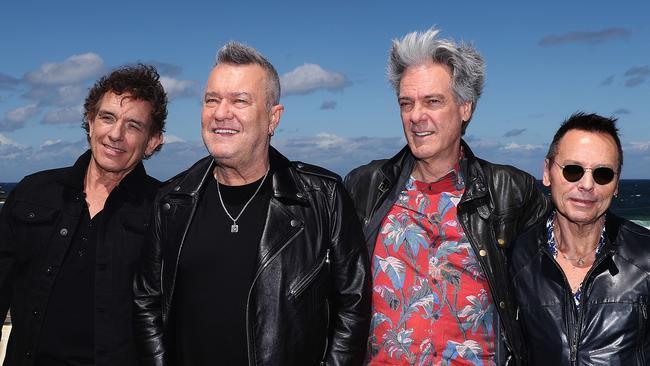
Four decades later, fans can expect Cold Chisel’s 2020 reunion tour to be just as memorable.
Starting New Year’s Eve in Fremantle, the band will play just 15 shows in support of their new album, Blood Moon.
“We knew if we were going to get the band back together for another full tour it would have to be something really special,” Barnes said.
“We wanted great line-ups and unusual places so people would remember these gigs for a long time.”
In honour of Cold Chisel’s legendary hellraiser, let’s raise a bottle to five more of the most explosive moments in Oz rock.
ROSE TATTOO’S COUNTDOWN KISS
In the ’70s and ’80s, no band played harder than Rose Tattoo.
The rockers didn’t just sing about being “bad boys” and “outlaws”, they played prisons, left pubs in ruins, had regular run-ins with the police.
Heck, Angry Anderson even belted himself in the face with his own microphone at the Reading Festival in 1981.
But what was it that got Rose Tattoo banned from the ABC?
Angry laying a kiss on guitarist Mick Cocks during their performance of Rock ‘n’ Roll Outlaw on Countdown in 1978.
Locked up in the ABC’s Elsternwick studios for a good six hours prior, they had knocked back multiple bottles of whiskey and slabs of beer, so hit the stage in a “very, very frivolous mood”, said Anderson.
“I had my arm around (Mick) and we were sort of jumping around on stage, and I kissed him. It filled the screen — my tongue disappearing down his throat,” the singer told a US men’s magazine.
“We got branded homosexuals and church leaders, teachers groups, everyone rang up and wrote petitions and said, ‘Never let them on television again’.”
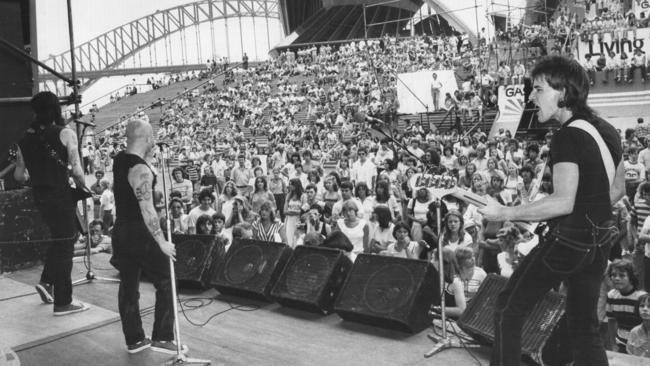
And they didn’t. Rose Tattoo were effectively censored from Australian TV and radio for years, their momentum hitting a brick wall.
In any footage of that Countdown performance you can dig up today, the kiss is conspicuously absent.
Speaking to the ABC 30 years later, Anderson still couldn’t see what all the fuss was about.
“We laughed it off because we thought it was the best publicity you could ever have,” he said.
“I’ve been kissing blokes all my life. I rode motorcycles and I played football, you know — kissing blokes is just second nature.”
NORMIE ROWE’S CONSCRIPTION
It was Australia’s Elvis moment: In late 1967, our reigning King of Pop was conscripted into the Army to serve in Vietnam, causing a news sensation.
All these years later, Normie Rowe still questions whether his birth date was drawn in a random ballot, or he was specifically chosen to be the propaganda poster boy for an unpopular war.

At the end of the ’60s, Rowe’s mop top and gyrating hips had teenage girls screaming and, much like one of his biggest hits, shakin’ all over.
Post-conscription, the mop top became a short back and sides as the star underwent basic training at Puckapunyal, before being shipped off to Vietnam in January 1969.
When his tour of duty ended in February 1970, Rowe, just 23, returned home hoping to pick up where his career had left off.
But, as he told the ABC in 2008, the war had “stopped it stone dead”.

“My pop music career was killed by my service in Vietnam, there’s no doubt about that,” he said.
“When I got back I couldn’t get a record company to be one bit interested in anything I wanted to do.”
Years later, Rowe was pulled over by a police officer who shared the same birth date, but had not been called for national service like Rowe had.
Rowe also revealed that a man had come to him with a deathbed apology from his late father — a member of Harold Holt’s staff.
He had said it was his idea to have Rowe called up to give the war a popularity boost.
However, the Australian War Memorial has confirmed that Rowe’s conscription was legitimate.
THE ANGELS’ SYDNEY OPERA HOUSE RIOT
New Year’s Eve, 1979. An estimated 110,000 people had gathered at the steps of the Sydney Opera House to see one of the country’s hottest bands ring in the new decade.
The show ended with The Angels’ bassist Chris Bailey and singer Doc Neeson knocked out and bloodied, sent by ambulance to St Vincent’s hospital.
The next day’s headlines read: “Night of terror.”
In 1979, The Angels had scored their first Top 10 album with No Exit and Am I Ever Gonna See Your Face Again was a hit.
But the band also had a reputation, one venue owner claiming: “Wherever The Angels perform there is damage and destruction of property.”
This show took it to the next level.
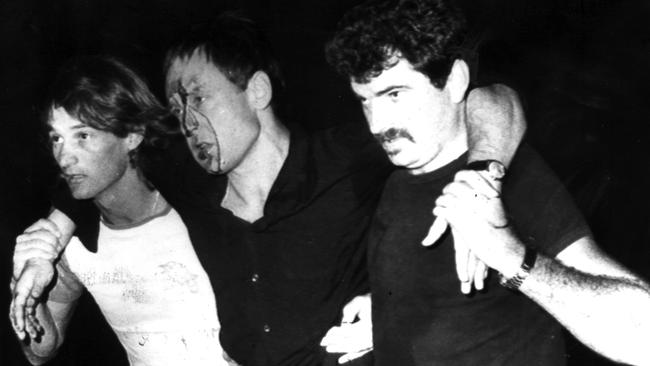
As Bob Yates recalled in his 2017 biography of The Angels, the stage that night was the target of constant incoming missiles from the audience, who after 12 hours of sun and alcohol had turned into an angry mob.
Rolf Harris had already “stormed off” after spending his truncated set “dodging beer cans and copping a tomato in the chest”.
“It hadn’t been vicious,” Yates wrote, “they were just bored lobbing up the empties. But as the night progressed, that changed”.
As midnight approached, the band wondered aloud whether they should be going on.
The mayor took the microphone to count in the New Year and was greeted with booing, swearing and more hurling of objects. Finally, the band let rip.
“Across the audience, clenched fists punch the sky and mayhem explodes into the midsummer night,” Yates wrote.
But the empty beer cans flying towards the stage were soon joined by bottles.
The Angels broke into another song, Marseilles.
“Then a bottle sails in and hits Chris Bailey. With blood streaming down his face he stumbles forward … a second later something ricochets off the back of Doc’s head and he topples to his knees,” Yates wrote.
“With two of the band down, the others grind to a ragged halt and look around, bewildered … With debris still arcing over the footlights, the roadies lift Chris and Doc and drag them off stage.”
MORE ENTERTAINMENT NEWS:
LIAM GALLAGHER HITS OUT AFTER GIG CUT OFF MID-SONG
WHY SIR ELTON’S FAREWELL SHOWS ARE THE PERFECT ENDING
1980s MUSIC VIDEOS WE STILL LOVE TO WATCH
Through the PA came cries of “That’s it! are you satisfied now? the show is over”.
Meanwhile, the live TV coverage was awkwardly wrapped up then and there: “Ladies and gentleman, The Angels have just walked off stage.
“The lead singer has left the stage. The guitarist was injured by a piece of sign that was thrown. He was taken off stage bleeding from the forehead. It’s time to wind it up here … Welcome to 1980. Happy New Year and good night.”
In the aftermath, rock music was banned from the Opera House — and wasn’t allowed back until Crowded House farewelled the world on its steps in 1996.
AC/DC ALMOST FIRE BON SCOTT
It’s the explosive Oz rock moment that never was — but it could have changed everything.
Had Bon Scott been fired from AC/DC in 1975 — as it was claimed the band was close to doing — that famous Long Way to the Top video, with the band on the back of a flatbed truck driving down Swanston St, would never have been made.
There would have been no Dirty Deeds Done Dirt Cheap. No Let There Be Rock. No Whole Lotta Rosie. Would there still have been an AC/DC?
It was 1975. The band had released their career-making album, High Voltage, in Australia in February, and it was making its way into the charts.
At the end of March, Scott was with two women when he tried heroin, and overdosed.
He had to be revived by paramedics. The incident shook the band.
In his 2013 book The Youngs: The Brothers Who Built AC/DC, author Jesse Fink learned of the almost-implosion from previous singer Mark Evans.
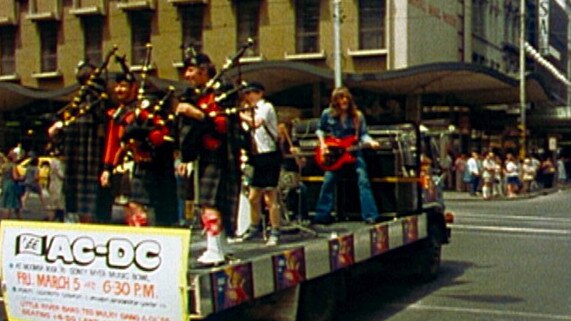
“There were some doubts about Bon at that stage,” Evans said.
“There was a moment of madness. That’s all I can put it down to. There was disquiet … It was just something that filtered through the band: that things weren’t looking good (for Bon).
“There was mention of another singer. But it never got to that point.”
Rumour has it The Easybeats’ frontman Stevie Wright was asked to step in.
AC/DC’s management denied the entire story.
RENEE GEYER SLAPPED MOLLY
To be fair, Molly was asking for it.
On Countdown’s 100th episode, in April 1977, Molly Meldrum was joined on the couch by John Paul Young and Renee Geyer.
The host sort-of-but-not-really apologised for giving JPY a nickname — “Squeak” — the singer doesn’t like.
Then Molly told JPY to “punch me in the nose”. He did. Next, Molly invited Geyer to slap him in the face “for all the ladies”. She did.
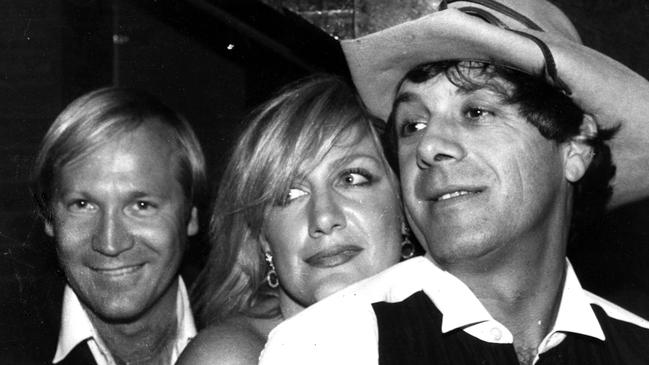
OK, so it was more a slight “pop” than an explosion — but Molly certainly had a knack for attracting chaos.
Geyer later hosed down talk of heated run-ins with Molly over the years.
“Molly loves the thought of drama and he wears it well. People look back and make a big thing out of something that might not have been as big … People say I slapped his face, but if you watch the footage, it was all in good fun.”
Cold Chisel will play A Day on the Green at All Saints Estate, Rutherglen, January 7, $119.90 to $199.90; Rochford Wines, Yarra Valley, January 10, sold out; Mt Duneed Estate, Geelong, January 11, sold out.
Blood Moon was released on December 6.
Originally published as The most explosive moments in Aussie rock music history


